Mineral Supplements for Dairy Cows
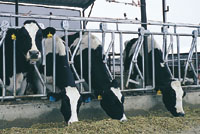 The supply of minerals, trace elements and vitamins to the high yielding dairy cow, should be regarded as an integral part of nutrition of equal importance to energy and protein supply.
The supply of minerals, trace elements and vitamins to the high yielding dairy cow, should be regarded as an integral part of nutrition of equal importance to energy and protein supply.
Mineral, trace element and vitamin supply can have a profound effect on production levels, as well as on herd health and fertility of high yielding cows.
Mineral nutrients are used in countless metabolic pathways within the dairy cows body. Even small mineral deficiencies can result in sub-optimal cow performance. Minerals affect many areas associated with massive financial costs to the dairy industry. These would include feed efficiency, lameness, clinical mastitis, high somatic cell counts, retained placenta, fertility, milk fever, general immunity and overall herd health and longevity of the dairy cow.
Correctly balanced minerals can lead to cost savings as well as
improved performance, cow health and fertility
Minerals that meet the Cows Requirements
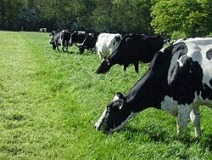 A planned approach to mineral nutrition is essential to ensure efficient and profitable milk production. It is no longer acceptable, profitable or desirable to do nothing and leave mineral requirements to chance. Equally it is no longer acceptable to feed a standard off the shelf mineral with out first checking that the cows requirements are met.
A planned approach to mineral nutrition is essential to ensure efficient and profitable milk production. It is no longer acceptable, profitable or desirable to do nothing and leave mineral requirements to chance. Equally it is no longer acceptable to feed a standard off the shelf mineral with out first checking that the cows requirements are met.
Remember as well that summer grazing contains no higher levels of mineral, than the grass silage fed during the winter. Cows mineral requirements do not drop in the summer.
Indeed mineral requirements at grass can be greatly increased due to higher levels of antagonists, such as Iron and Molybdenum resulting from soil ingestion. Grazing cattle have been shown to ingest anything between 0.1kg and 1.3kg of soil per day.
Could this be the reason that many dairy herds have trouble with performance and fertility of their cows during the Autumn, most years?
Also it should also be remembered that late lactation cows, as well as heifers, beef cattle and dry cows on mainly forage diets and receiving little or no compound feed also have requirement for minerals, vitamins and trace elements.
The RWN approach to Balancing Mineral Requirements
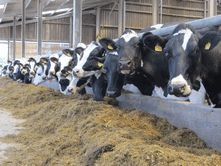 RWN has many years experience in formulating specialist minerals specifically to meet the nutritional
requirements of individual dairy herds. Formulations are based on mineral levels shown by mineral forage
assays together with mineral contribution from the rest of the diet. This is done using our own advanced
computer software developed by Richard Webster specifically for UK conditions.
RWN has many years experience in formulating specialist minerals specifically to meet the nutritional
requirements of individual dairy herds. Formulations are based on mineral levels shown by mineral forage
assays together with mineral contribution from the rest of the diet. This is done using our own advanced
computer software developed by Richard Webster specifically for UK conditions.
First we balance the "Macro-minerals". Macro-minerals are those needed in relatively large amounts these include Calcium, Phosphorous, Magnesium and Sodium. These are are generally expressed in percentage of the diet and are fed in grams per day per cow.
Next we balance the "Micro-minerals", needed in trace amounts measured in milligrams or micrograms. These trace elements include Copper, Manganese, Cobolt, Iodine, Zinc and Selenium. These tiny amounts of micro-minerals or trace elements, along with vitamins are absolutely essential. The cow cannot live without them. They are used in hormones, enzymes, and countless metabolic pathways.
We have many years experience of formulating minerals for individual dairy herds using our own advanced software
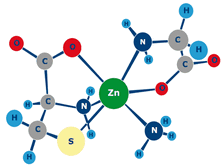 Under supply of trace elements can limit animal performance, cause infertility and impair the immune system, increasing disease incidence as well as mastitis, hock infections and lameness. Over supply can lead to toxicity especially in the case of copper in permanently housed cows on maize and wholecrop diets fed high levels of compound feed via robots or out of parlour feeders.
Under supply of trace elements can limit animal performance, cause infertility and impair the immune system, increasing disease incidence as well as mastitis, hock infections and lameness. Over supply can lead to toxicity especially in the case of copper in permanently housed cows on maize and wholecrop diets fed high levels of compound feed via robots or out of parlour feeders.
Availability, absorption and retention of different ingredients sources used in commercial dairy minerals varies widely. The situation is made more challenging since minerals nutrients interact with each other which can reduce absorption or effectiveness. Our formulation software takes account of levels of availability of different sources as well as mineral and trace element interactions.
This approach allows effective supplementation meeting the requirements of modern high yielding dairy cows even in the presence of major trace element 'lock up' problems widely seen in the UK.
RWN has successfully overcome mineral associated problems on a wide range of dairy farms, as well as in most cases offering considerable cost savings.
The Role of Protected Minerals
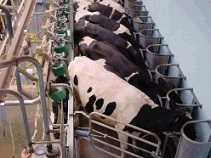 Most mineral deficiency in the UK, is not due to primary deficiency or a lack of a particular
mineral nutrient, but rather is due to secondary mineral deficiency caused by mineral interactions
where high levels of one mineral nutrient act as an antagonist preventing the absorption or "locking
up" another mineral nutrient.
Most mineral deficiency in the UK, is not due to primary deficiency or a lack of a particular
mineral nutrient, but rather is due to secondary mineral deficiency caused by mineral interactions
where high levels of one mineral nutrient act as an antagonist preventing the absorption or "locking
up" another mineral nutrient.
This is why feeding high levels of inorganic or non-protected minerals often fails to have the desired result and may even be detrimental to the cow.
Chelation is a process where a metal ion is attached to an amino acid, thus protecting it from interactions in the rumen as well as increasing both its absorption and its retention within the body. There are various forms of chelated or protected minerals available which can be used to overcome many of these mineral interaction problems.
 Selenium can be incorporated into the protein of yeast cells as in Alkosel
and Sel-Plex which are many times more effective than sodium selenite which is poorly retained in the body.
Selenium can be incorporated into the protein of yeast cells as in Alkosel
and Sel-Plex which are many times more effective than sodium selenite which is poorly retained in the body.
Protected or chelated minerals are digested along with their carrier rather than as an inorganic salt. 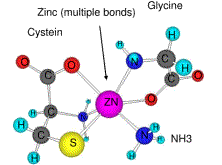 Different protected sources vary markedly, some types being much more effective than others.
Different protected sources vary markedly, some types being much more effective than others.
Whilst protected minerals cost more than inorganic sources of mineral, protected minerals are far more effective. Additionally much lower levels are required, which avoids undesirable interactions caused by feeding high levels of inorganic minerals.
Quality Minerals for Dairy Cows
When sourcing minerals we never compromise on quality. The quality of ingredients in a mineral
can vary widely, with some sources having much higher levels of bio-availability than others. Research indicates in chelation or bonding strength between different chelated, organic or protected mineral
sources varies widely. Some protected sources of minerals are much better than others as can be seen below. 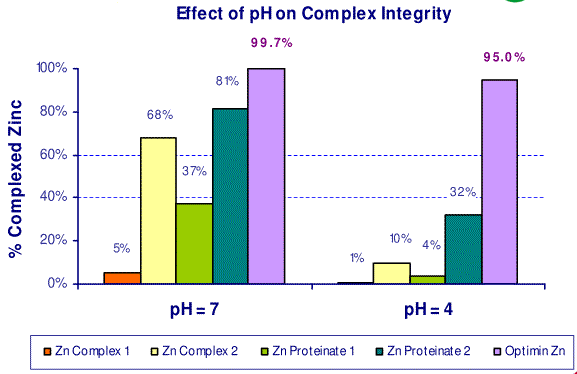
The use of chelates in a wide range of research trials with dairy cows have shown an average return on investment in excess of 10:1 when compared with standard inorganic trace elements. As well as being very cost effective skilled formulation of minerals using high quality ingredients including chelated copper, zinc and manganese, and selenium in the form of Alkosel and Sel-Plex to meet the cows requirements, offers many advantages over feeding a standard off the shelf mineral supplement.
RWN Mineral Supplements
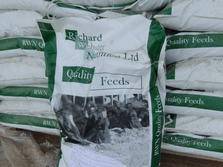 Many of our customers have been able to feed a lower rate of mineral after we have taken a forage
mineral sample and optimised the required rate against the current ration. Use of better quality, more
bio-available ingredients allows us to formulate a mineral to fully meet the cows requirements whilst
feeding less mineral at a lower cost per cow.
Many of our customers have been able to feed a lower rate of mineral after we have taken a forage
mineral sample and optimised the required rate against the current ration. Use of better quality, more
bio-available ingredients allows us to formulate a mineral to fully meet the cows requirements whilst
feeding less mineral at a lower cost per cow.
The main benefit to our customers are the better results achieved as a result of improved mineral coverage as shown in higher levels of output together with improved herd health and fertility. Our customers have the confidence that they are supplementing with the best quality minerals available, well balanced and competitively priced.
Much improved overall mineral coverage at a lower cost per cow
We source our mineral supplements from 2 or 3 UK manufacturers, with whom we have long term supply arrangements, and where we can guarantee both quality and service. RWN Mineral Supplements are available both as 'In Feed' and as 'Free Access' powdered minerals as well as in free access molassed mineral buckets. We also supply a full range of straight minerals including rock salt, calcined magnesite, magnesium chloride, limestone flour, dicalcium phosphate, sodium bicarbonate and copper sulphate.
Minerals can have a profound effect on the Performance, Health and Fertility of both Dairy Cows and Dairy Heifer Replacements
RWN is one of the most competitively priced mineral supply companies in the UK so please ask for a quote today or contact Richard Webster for an in depth consultation.
